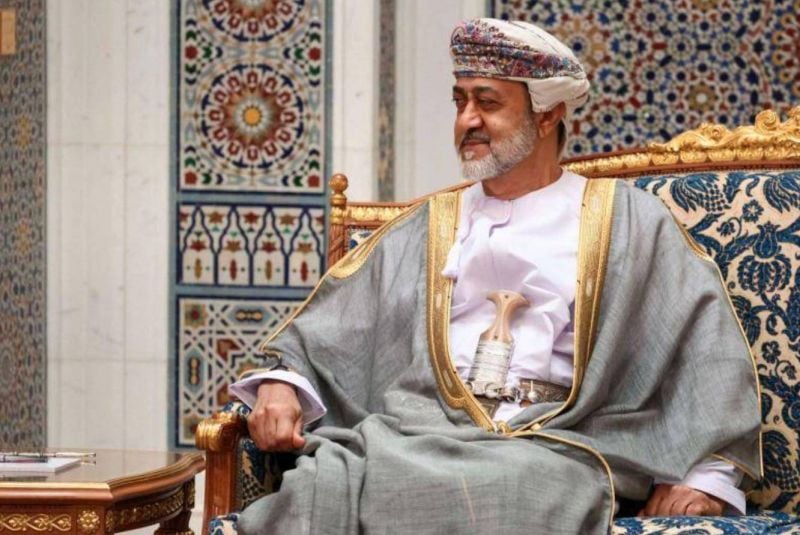
From Muscat, the Omani sultan Haitham ben Tariq plays the role of discreet regional mediator. (Credit: AFP Archives)
The United States opened a communication channel with the Syrian regime in Oman several months ago, L’Orient-Le Jour learned from two Arab diplomats who requested anonymity due to the sensitivity of the subject.
Several direct meetings took place between the two delegations. According to the diplomats, the focus of the discussion was the release of US hostages in Syria, in particular journalist Austin Tice, who has been missing since 2012.
“We know with certainty he has been held by the Syrian regime,” US President Joe Biden said in a statement on Aug. 10, 2022.
“We have repeatedly asked the government of Syria to work with us so that we can bring Austin home,” he added.
The former head of Lebanon’s General Security, Abbas Ibrahim, previously acted as an intermediary between Washington and Damascus for some time. To the surprise of many, Ibrahim’s term in office was not extended in February.
Prelude to broader talks
While Washington seems to have thrown its weight into recovering US hostages, negotiations with Damascus were not limited to this subject, the diplomatic sources confirmed, indicating that the discussions had a political scope as well.
Washington told Damascus that the release of hostages could be a first step towards broader negotiations.
According to the US, negotiations should focus on Iranian presence in Syria, the release of political detainees, the implementation of political and constitutional reforms and the fight against Captagon trafficking. Today, Syria is the world's main producer of the illicit drug.
At the official level, the US has shown no signs of reengaging with the Syrian regime.
“We are not normalizing relations with the Assad regime, nor are we funding reconstruction of the damage inflicted by the regime during the conflict or lifting sanctions,” they declared on March 16, in a joint statement with the UK, France and Germany.
This policy is reflected in the US’ Caesar Act of 2020, which sanctions any person, company or institution trading with the government in Damascus or contributing to the reconstruction of the country.
The same diplomatic sources told L’Orient-Le Jour that negotiations in Oman have allegedly collapsed due to the Syrian regimes’ demands. Assad is demanding that the US troops leave eastern Syria as a precondition for any serious discussion.
It is estimated that at least 900 troops are present in eastern Syria, supporting the Kurdish forces in their fight against the Islamic State organization.
The Syrian regime hopes to regain control of the entire territory, including the oil-rich Kurdish-controlled areas. The Kurdish administration recently issued a statement saying it is open to “dialogue with the Syrian regime.”
According to news website Al-Monitor, the commander-in-chief of the Syrian Democratic Forces, Mazloum Kobane, visited the United Arab Emirates in early April and asked the UAE authorities to help press the Kurds’ case with Bashar al-Assad, who was received in March in Abu Dhabi with much pomp.
Regional normalization
While negotiations with the US have not progressed, the regime can be placated with the speed up of its re-normalization in the Arab world. Assad seemingly wants to take advantage of this situation before opening serious discussions with the US. Several countries in the region, in particular Saudi Arabia, reached out to Damascus in recent weeks.
Saudi Arabia’s awareness of the direct negotiations between Washington and Damascus accelerated its rapprochement with the Syrian regime, said the two diplomats.
“Saudi Arabia feared it would be left out of the negotiations, as it was on the Iranian nuclear issue,” said one of them. The United States had previously reached an agreement with Iran in 2015 in spite of their Saudi ally’s opinion, holding talks through Muscat.
According to L’Orient-Le Jour’s diplomatic sources, the US tried to limit the scope of the rapprochement between Damascus and the Arab countries, without blocking it.
The Gulf countries, Jordan, Iraq and Egypt met Monday in Amman to discuss Syria’s return to the Arab League. The US intervened so that Syria’s return would be based on conditions that respect UN Resolution 2254, which lays the foundations for a political solution in Syria and the settlement of the refugee issue.
Saudi Arabia continues to push for Syria to participate in the next Arab summit that is expected to be held on May 19 in the kingdom. To this end, Riyadh is organizing a special meeting of Arab foreign ministers on Sunday to reach an agreement.
This article was originally published in French in L'Orient-Le Jour. Translation by Joelle El Khoury.